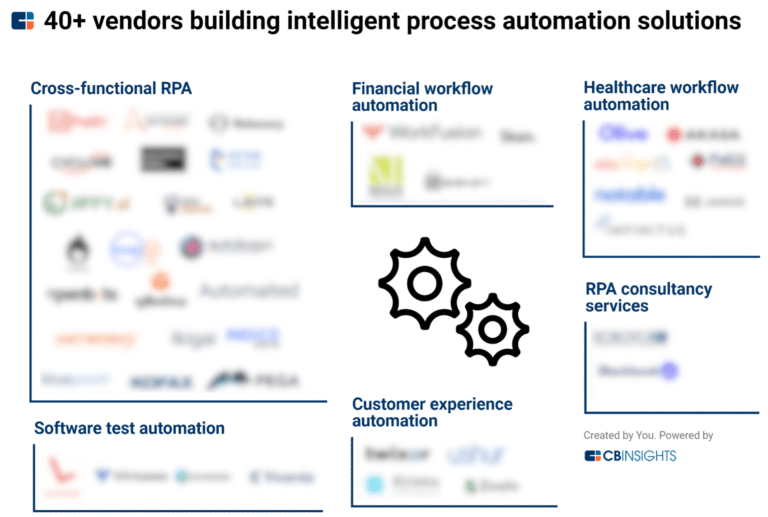
Ushur
Founded Year
2014Stage
Series C | AliveTotal Raised
$92MLast Raised
$50M | 2 yrs agoMosaic Score The Mosaic Score is an algorithm that measures the overall financial health and market potential of private companies.
-101 points in the past 30 days
About Ushur
Ushur specializes in AI-powered Customer Experience Automation within the technology sector and focuses on end-to-end customer journey automation. The company offers a no-code, cloud-native SaaS platform that enables enterprises to engage customers through conversational AI and automated workflows across various communication channels. Ushur's solutions cater to high-contact industries such as insurance, healthcare, and financial services, providing intelligent document processing and secure, omnichannel interactions. It was founded in 2014 and is based in Santa Clara, California.
Loading...
Ushur's Product Videos
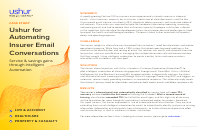
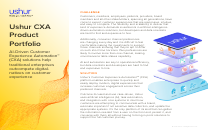
ESPs containing Ushur
The ESP matrix leverages data and analyst insight to identify and rank leading companies in a given technology landscape.
The insurance customer communication market enables insurance companies to automate and improve communication with policyholders. The market is characterized by the use of smart SMS platforms, mobile apps, self-service portals, and AI-enabled chatbots. Many companies in this space offer third-party integrations with other tech vendors. These solutions can help insurance companies reduce customer s…
Ushur named as Leader among 13 other companies, including Twilio, Hi Marley, and FICO.
Ushur's Products & Differentiators
Conversational Apps
Conversational Apps enables enterprises to power asynchronous conversations through SMS, web, email, messaging apps and more to automate two-way engagements and self-service tasks. Healthcare companies use Conversational Apps to collect and share information related to service requests, appointments, care services, surveys, and more. By automating conversations through asynchronous, self-service channels, customers communicate at their convenience - when and where they prefer - while enterprises accelerate speed to resolution and save man hours for inbound/outbound support.
Loading...
Research containing Ushur
Get data-driven expert analysis from the CB Insights Intelligence Unit.
CB Insights Intelligence Analysts have mentioned Ushur in 4 CB Insights research briefs, most recently on Dec 18, 2023.
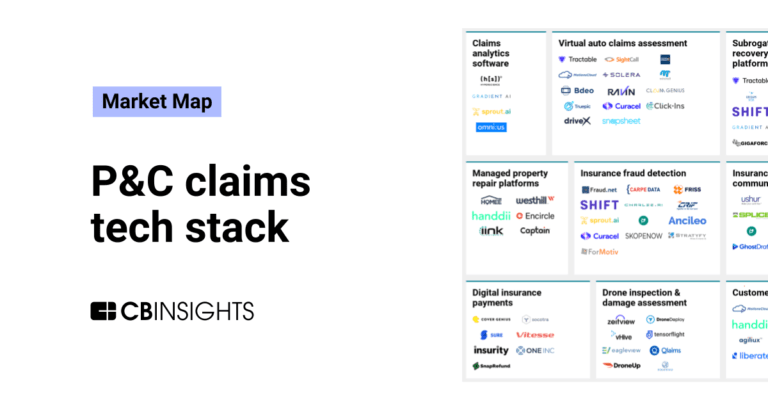
Dec 18, 2023
The P&C claims tech stack market map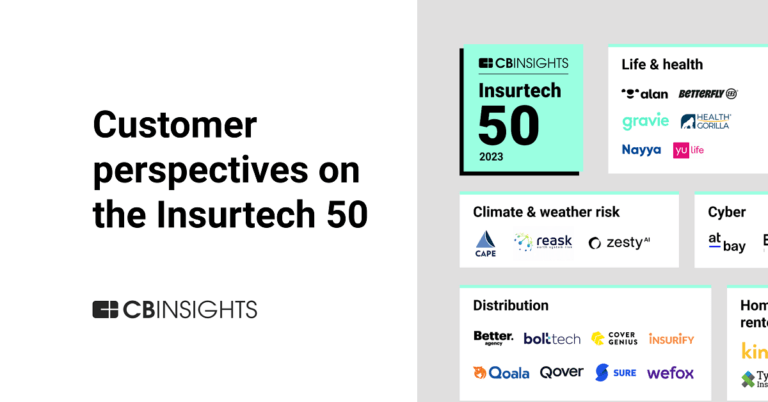
Aug 1, 2023
Customer perspectives on the Insurtech 50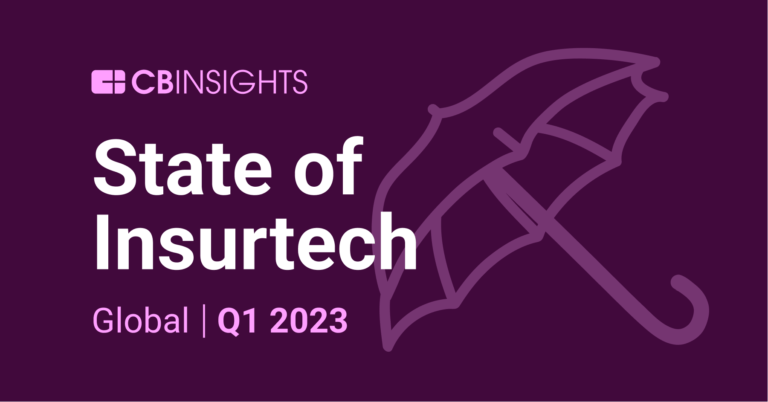
May 9, 2023 report
State of Insurtech Q1’23 ReportExpert Collections containing Ushur
Expert Collections are analyst-curated lists that highlight the companies you need to know in the most important technology spaces.
Ushur is included in 8 Expert Collections, including Robotic Process Automation.
Robotic Process Automation
322 items
RPA refers to the software-enabled automation of data-intensive tasks that are low-skill but highly sensitive operationally, including data entry, transaction processing, and compliance.
Insurtech
4,417 items
Companies and startups that use technology to improve core and ancillary insurance operations. Companies in this collection are creating new product architectures, improving underwriting models, accelerating claims and creating a better customer experience
Fintech
9,394 items
Companies and startups in this collection provide technology to streamline, improve, and transform financial services, products, and operations for individuals and businesses.
Sales & Customer Service Tech
600 items
Companies offering technology-driven solutions to enable, facilitate, and improve customer service across industries. This includes solutions pre-, during, and post-purchase of goods and services.
Insurtech 50
50 items
Digital Banking
814 items
Ushur Patents
Ushur has filed 9 patents.
The 3 most popular patent topics include:
- artificial intelligence
- computational linguistics
- data management

Application Date | Grant Date | Title | Related Topics | Status |
|---|---|---|---|---|
8/18/2021 | 9/26/2023 | Natural language processing, Computational linguistics, Data management, Artificial intelligence, Semantic Web | Grant |
Application Date | 8/18/2021 |
|---|---|
Grant Date | 9/26/2023 |
Title | |
Related Topics | Natural language processing, Computational linguistics, Data management, Artificial intelligence, Semantic Web |
Status | Grant |
Latest Ushur News
Dec 9, 2024
RegTech Analyst How Ushur is driving secure and compliant AI adoption in Regulated Industries December 09, 2024 From Left to right: Henry Peter, CTO and Co-founder, Chandra Sekhar Dash, Senior Director of Governance, Risk and Compliance (GRC) and Cybersecurity, and Vijayendra Shamanna (Viju), VP of AI Labs. AI and GenAI have become staples in regulated industries. While they bring a lot of exciting opportunities, they also carry a lot of cybersecurity, regulatory and data privacy concerns. One company that is helping companies in regulated industries, such as financial services, healthcare and insurance to leverage the full capabilities of modern AI systems is Ushur , but not at the expense of security, compliance or ethical responsibility. To explore how its technology is achieving this, FinTech Global Senior Editor James Haxell recently detailed a conversation between Henry Peter, CTO, CISO, and Co-founder of Ushur, and Chandra Sekhar Dash, Senior Director of GRC and Cybersecurity, and Vijayendra (Viju) Shamanna, VP of AI Labs, both of whom play pivotal roles in Ushur’s innovation, security, and compliance efforts. With over two decades of expertise in governance, risk, and compliance (GRC) and cybersecurity, Chandra has spearheaded initiatives across diverse industries, including SaaS, pharmaceuticals, healthcare, and telecommunications. At Ushur, he plays a pivotal role in developing robust security and compliance frameworks, managing certification processes, and overseeing AI governance. Meanwhile, Viju leads Ushur’s AI innovation efforts, advancing cutting-edge developments in artificial intelligence. Ushur is a customer experience automation platform that is on a mission to help companies improve both their customer and employee journeys. Its technology is used by companies in the insurance, banking and healthcare sectors, including Cigna, Irish Life, Aflac, Unum and many more. Its AI-powered technology has numerous use cases, including absence engagement , customer service, onboarding , claims processing, sales, medication adherence, quote and RFP intake, chronic condition management and much more. By streamlining these processes, companies are able to deliver more responsive and empathetic experiences at scale while also achieving operational efficiency far less expensively, faster, and with lower risk than modernizing existing enterprise applications. As businesses accelerate their use of cutting-edge technologies, ensuring robust data protection, ethical governance, and adherence to industry regulations becomes more critical than ever. This means aligning with regulatory requirements as well as ensuring the security of the tools and their data protection. Chandra Sekhar Dash, Senior Director of GRC and Cybersecurity at Ushur, is at the centre of maintaining the delicate balance between fostering technological progress and maintaining the highest standards of cybersecurity and compliance.. “When I joined Ushur, the primary focus was on integrating GRC into every facet of our operations,” said Dash. As an AI-native organization, automation has always been central to our offerings, hence, the need for a strategic approach to cybersecurity and compliance became even more profound. We realized that innovation cannot be at the expense of customer trust and data security. Balancing these competing priorities has been a defining aspect of my work here at Ushur.” To achieve this, Sekhar Dash has supported Ushur through numerous certification processes including, HITRUST r2, ISO 27001, SOC 2, PCI-DSS, as well as maintaining adherence to data privacy regulations, such as GDPR, CCPA, and HIPAA. These all serve as a benchmark for security, privacy and risk management and empowers Ushur to innovate and remain compliant. He added, “It’s not just about meeting compliance standards; it’s about embedding a culture of security across the organization. This includes educating teams about best practices, ensuring secure data handling in our AI models, and continuously reviewing our policies to account for emerging risks—especially as it pertains to GenAI.” AI Governance and Compliance Viju Shamanna, VP of AI Labs at Ushur, addressed the challenges of developing AI solutions that are both innovative and secure. He explained how Ushur’s AI systems are governed to ensure they meet rigorous security standards and comply with standards set out by GDPR, CCPA, and evolving regulatory frameworks like the EU AI Act. One of the biggest challenges the industry faces with AI models is ensuring they are transparent. This includes maintaining transparency in how AI models make decisions, ensuring no bias is introduced, and managing the risk of adversarial attacks.Legislation around the world is changing with a focus on AI solutions being transparent and that important decisions are not made through black box systems. “Our approach is holistic—we ensure transparency in AI decision-making, mitigate bias, and maintain robust data privacy protocols,” said Shamanna. “By working closely with Chandra and his team, we ensure our AI models not only deliver value but are also safe, explainable, and compliant.” Shamanna emphasized the importance of continuous monitoring and collaboration between the AI and cybersecurity teams, as well as proactive risk management strategies, to ensure AI models are free from adversarial attacks and data misuse. How to safely implement Gen AI GenAI has dominated talks of innovation for the past few years. Its advanced capabilities have captured the minds of many institutions, who are looking at how the technology can transform their customer engagement and help automate repetitive manual tasks for employees. It comes as no surprise that many regulated industries have already engaged with GenAI, with over 40% of financial institutions using the technology in some form according to Statista . While it is easy to be distracted by the potential benefits GenAI can bring, there are several new and complex risks attached to its use. Dash said, “While traditional cybersecurity concerns like unauthorized data access, hacking, and system vulnerabilities remain critical, AI introduces unique challenges such as adversarial attacks on AI models, data poisoning, prompt injection, and even biases in machine learning algorithms. As these AI systems become more autonomous, it’s no longer just about protecting the data — we must also safeguard the decision-making processes of the AI itself.” To overcome these risks, Ushur adapted its cybersecurity and GRC frameworks by adopting a ‘privacy by design’ approach for its AI systems. This means privacy and data security are now embedded into them from their foundations. It has also implemented continuous monitoring and auditing processes that monitor and refine security measures around AI. Dash believes this allows Ushur to adapt and respond to potential vulnerability when they emerge with new AI developments. He added, “At Ushur, we’ve taken it a step further by integrating robust guardrails into our AI-driven solutions. These include real-time monitoring, content filtering, and continuous model evaluation to ensure that AI-generated outputs meet the highest standards for accuracy, security, and ethical integrity. These safeguards help us detect and mitigate any biases or inaccuracies that might arise, protecting our clients from reputational risks. By proactively managing the flow of data and monitoring every interaction, we ensure that our AI solutions maintain the trust and reliability that our clients rely on.” Commitment to socially responsible AI Peter’s next question for the interviewees took aim at the bias, fairness and accountability risks that come alongside GenAI. He posed Shamanna the question of how Ushur ensures its AI systems are socially responsible. Shamanna explained, “At Ushur, we take these concerns very seriously. We recognize that AI systems must be designed to serve all customers fairly and equitably. To minimize bias, we ensure that our training datasets are diverse and represent the broad range of users our solutions will serve. Our Training data sets are thoroughly curated by our in-house team of industry experts and annotators to remove any potential sources of bias, privacy leakage, etc. We also implement rigorous testing processes to assess the fairness of our AI models and to identify any unintended biases that might emerge.” Additionally, Shamanna pointed to the company’s focus on transparency. All its AI systems it uses are designed with explainability in mind, allowing for decisions to be examined and understood. This allows users to assess any potential concerns around a decision and determine if the AI has made a mistake. “This transparency is crucial for both our customers and regulatory bodies to trust our AI systems,” he added. On a final note, he pointed back to the collaboration between teams. They work in tandem to assess and evolve governance processes to ensure all AI applications are meeting regulatory requirements but can also be trusted. The biggest cybersecurity challenges facing AI Cybersecurity is a major and constant challenge for regulated institutions. As AI continues to evolve, so do new and emerging cybersecurity challenges for firms to combat. Peter asked for Dash’s perspective on what some of those future challenges might be. Dash said, “Looking ahead, the primary challenge will be maintaining a balance between technological advancement and security. As AI continues to advance, especially in areas like deep learning and generative models, we will see more complex risks. AI models themselves could become the target of attacks, such as adversarial inputs that aim to manipulate AI decision-making. There are also concerns around the ethical use of AI, such as biases in algorithms or the unauthorized use of customer data.” Ushur is addressing these risks by staying ahead of the curve and investing in AI security and testing. The company’s cybersecurity, GRC and AI teams are all working together to ensure each AI project is rigorously vetted. It is also establishing scalable management frameworks that can adapt to new AI challenges as they arise. The future of AI compliance Looking to the future, Dash outlined the role GRC frameworks will play in the governance of AI. He said, “As AI technologies evolve, GRC frameworks will become even more integral in ensuring responsible and secure AI deployment. These frameworks will not only need to manage the traditional aspects of risk and compliance but also incorporate specific guidelines for AI governance, such as model explainability, transparency, and fairness. As regulatory bodies begin to catch up with AI innovation, we expect that GRC frameworks will need to adapt quickly to meet new regulations such as the EU AI Act.” Staying ahead of the curve, Ushur has already implemented policies covering the use of AI. It also keeps its finger on the pulse of the market and consistently evaluates emerging regulatory frameworks to ensure compliance with evolving regulations that demand greater transparency, accountability, and ethical usage.. “The future of AI governance will be about creating a dynamic, adaptable system that can handle the complexities and risks associated with AI while maintaining customer trust and compliance” said Dash. Shamanna echoed this, noting that Ushur’s AI solutions are designed with fairness, transparency, and security in mind. “At Ushur, we’re taking a proactive approach to AI safety by embedding rigorous technical safeguards into our systems. This includes implementing explainability protocols to ensure that AI decisions are understandable, traceable, and justifiable.” As businesses continue to leverage AI and GenAI for innovation, the challenge of balancing cutting-edge technologies with the highest standards of cybersecurity and compliance will only grow. Ushur’s leadership is committed to staying ahead of the curve by integrating robust cybersecurity practices and adaptive risk management frameworks, ensuring that the company’s AI-driven solutions remain secure, compliant, and trustworthy. “At Ushur, we are not just focusing on compliance—we are embedding security, privacy, and ethical principles into the core of our AI technologies,” concluded Dash. , “We are building frameworks that are adaptable to both current and future regulatory standards, enabling us to stay ahead of emerging risks as AI continues to advance at a rapid pace.” The full interview transcript can be found here . Copyright © 2024 RegTech Analyst
Ushur Frequently Asked Questions (FAQ)
When was Ushur founded?
Ushur was founded in 2014.
Where is Ushur's headquarters?
Ushur's headquarters is located at 3975 Freedom Circle, Santa Clara.
What is Ushur's latest funding round?
Ushur's latest funding round is Series C.
How much did Ushur raise?
Ushur raised a total of $92M.
Who are the investors of Ushur?
Investors of Ushur include 8VC, Third Point Ventures, Iron Pillar, Aflac Ventures, Pentland Ventures and 8 more.
Who are Ushur's competitors?
Competitors of Ushur include Spixii, DANAConnect, Airkit, EasySend, mPulse Mobile and 7 more.
What products does Ushur offer?
Ushur's products include Conversational Apps and 4 more.
Who are Ushur's customers?
Customers of Ushur include Benefitfocus.
Loading...
Compare Ushur to Competitors

Pypestream specializes in AI-powered customer experience automation within various business sectors, including insurance, telecommunications, retail, and more. The company offers an omnichannel platform that leverages conversational AI to provide personalized, efficient customer service and support through a library of microapps. Pypestream's solutions are primarily utilized by industries such as insurance, telecommunications, retail, quick service restaurants, travel, hospitality, and real estate. It was founded in 2015 and is based in New York, New York.

Rasa focuses on providing enterprise-grade for business sectors. The company offers a suite of products that enable personalized and scalable customer interactions through text- and voice-based AI. Rasa's solutions cater to industries such as financial services, healthcare, telecom, and travel and transport. Rasa was formerly known as LastMile Technologies. It was founded in 2016 and is based in San Francisco, California.

ProNavigator focuses on knowledge management for the insurance industry, offering a platform that manages information for insurance professionals. The company provides services including intelligent search and discovery, version control, security, and analytics. ProNavigator serves insurance carriers, brokerages, and agencies. It was founded in 2016 and is based in Kitchener, Canada.

Rightindem specializes in digital claims management solutions within the insurance industry. The company offers a digital platform that streamlines the claims process by assessing, routing, and resolving claims efficiently, enhancing customer experience and operational efficiency. Rightindem's platform serves various sectors within the insurance industry, providing a white-label solution that can be customized to fit different lines of business. It was founded in 2016 and is based in London, England.

Kasisto focuses on conversational artificial intelligence solutions, primarily in the banking and finance sector. The company offers a platform that provides intelligent digital assistants, designed to facilitate accurate, human-like conversations and empower teams with financial knowledge. Kasisto primarily serves global financial institutions, regional banks, community banks, and credit unions. It was founded in 2013 and is based in New York, New York.

SPLICE Software provides automated customer engagement solutions within the communication sector. The company offers services such as mass automated messaging and customized messaging for various use cases, alongside integrations with existing customer data across multiple channels including voice, text, email, and voice-first technologies. SPLICE Software serves the insurance, retail, finance, and healthcare industries. It was founded in 2006 and is based in Calgary, Alberta.
Loading...
